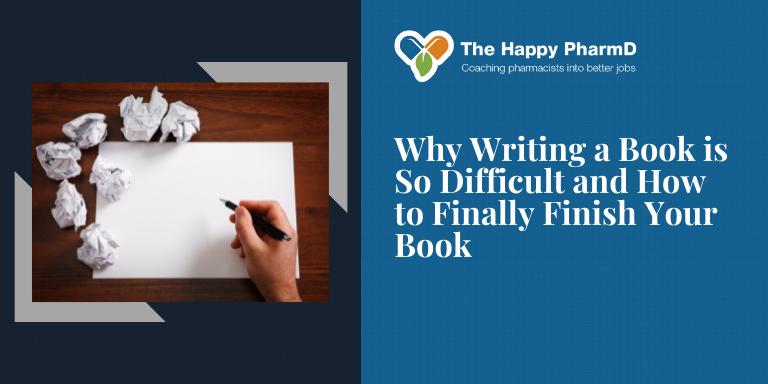You’re a fake, Alex.
This thought plagues me every time I put my fingers on the keyboard.
No one will buy your book. You don’t have a valuable career. You haven’t accomplished much. No one is going to listen. Who are you to write about pharmacy careers?
Writer Joseph Epstein said that 81 percent of Americans aspire to write a book. Statistically speaking, however, less than one percent will ever actually write one.
I’m guessing that, of the 81 percent, at least 80 percent of them struggle the same way I do (since only 1 percent ever actually writes a book). I’ve wanted to write this book for a year, but I never made time for it.
Until now.
As I work on my newest book, The Indispensable Pharmacist, I’ve realized this process is more challenging than I ever anticipated. Shouldn’t it be easy, though? Write a few words every day, and you’ll have a book by the end of the year.
So why don’t more people do it?
Everyone has the same number of hours available in a day. Famous authors J.K. Rowling and Andy Weir weren’t full-time writers when they started. They had other jobs.
So what makes them different from you and me? Why are they able to finish a book when so many others are not?
I’m sharing my own writing struggles for two reasons. First, because sharing my struggles with others makes it easier to cope with those struggles. Secondly, because I want to share inspiration with anyone else who is thinking of writing a book.
I’m hoping to provide inspiration for you to sit down and write your own book. I’m also hopeful that if I share how I’ve overcome my own barriers to success, you can do the same.
1. Schedule time every day.
I wake up 45 minutes earlier than normal to write this book. I write in the morning because that’s when my mind is sharpest. I’m creating a habit of writing.
I’m forcing myself to write this book and enjoy the process because I get to log my word count and I am constantly striving to top my previous day’s efforts.
2. Create deadlines.
Deadlines are powerful motivators. Without deadlines, this book would be my lowest priority.
Instead, I set a goal to write a book in six weeks and I started during Thanksgiving break. The first week wasn’t exactly productive because it was my vacation, but I’m writing every day and I’m enjoying the process.
3. Recognize imposter syndrome.
I’ve struggled with imposter syndrome for years, and as I work on this book, the negative comments continue to come. Although I’ve written books before — one about the Pharmacy College Admission Test and one about masterminds — I wasn’t prepared for this.
What I’ve learned is that imposter syndrome will paralyze you. Born out of your brain’s desire to protect you from failure, it’s a natural tendency to avoid the kind of fear that likely scarred you in the past. It’s an attempt to prevent future failures, but it will immobilize you if you allow it.
4. Take action.
If I allow them to, negative thoughts will impact my patterns of behavior. Specifically, negative thoughts will prompt me to avoid writing.
Some people employ affirmations to overcome negative thoughts, but I find that action is a better solution. Instead of allowing my thoughts to influence my actions, I use my actions to influence my thoughts. I write every day. I track the words I write. I’m moving the words out of my head and on to the page.
5. Turn off your inner editor.
In our fast-paced society, we’ve trained ourselves to constantly edit. We write emails and text messages quickly, and we focus on being succinct and efficient rather than creative.
That isn’t the way to write a book, though. If you’re constantly editing yourself, you’ll eventually stop writing. You’ll convince yourself that your writing is bad, and you’ll simply stop doing it.
No one is going to believe you. This doesn’t make sense.
It’s that voice again.
My inner editor has kept me from writing this book for a year because I was worried about what I would say. By turning off that editor, I allow myself to simply write words. Instead of worrying about whether things make sense, I can put words on the page in an uninhibited way.
By creating two writing phases, I’ve become a more efficient and a better writer.
6. Invest in your work.
I hired a coach to help me write a book because I think it’s worth the investment. I think this book will lead to speaking opportunities, new clients, and it will serve as a professional calling card for me.
7. Inspire readers.
The book How to Win Friends and Influence People changed my life. It changed the trajectory of my life and my career.
I want my book to be equally inspiring. I want people to change who they are and what they are doing after they read it. I want them to recall that their careers changed after they read it.
Writing that kind of book creates pressure, but the same kind of pressure is responsible for the creation of diamonds.
Have you ever thought about writing a book? What’s stopping you? What can you do to get started?
Don’t wait until the new year to embark on your goals. You won’t be a different person on January 1st. Start now.
Remember that the voice inside you is wrong.

Alex is the Founder of The Happy PharmD. He loves anime, his family, and video games, but not in that order.


